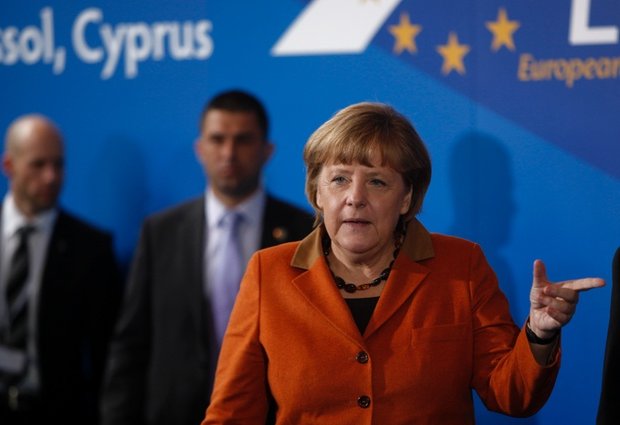Germany and EU leading bankers have urged the Cypriot parliament to quickly find a way of raising the 5.8 billion euros needed to qualify for an international bailout.
German Chancellor Angela Merkel warned Cyprus not to “exhaust the patience of its eurozone partners”, reports say.
The head of one of Cyprus’ biggest banks urged MPs to accept a levy on bank deposits.
This was rejected on Tuesday, sparking a fresh eurozone confidence crisis.
A much-delayed emergency session of parliament is due to vote on a new package of measures to raise the 5.8 billion euros ($7.5 billion) needed to qualify for the 10 billion-euro bailout.
Averof Neophytou, deputy leader of the governing Democratic Rally party, said political leaders were nearing a compromise and a breakthrough was possible on Friday.
Government spokesman Christos Stylianides said the authorities were engaged in “hard negotiations with the troika”, referring to the EU, the European Central Bank and the IMF, the AFP news agency reports.
Banks have been closed since Monday and many businesses are only taking payment in cash.
The details of the latest proposals are not clear and our correspondent says the eurozone will want to examine the figures carefully.
Cypriot Finance Minister Michael Sarris has returned from Moscow, where he failed to garner Russian support for alternative funding methods.
He said a levy “of some sorts” remains “on the table” despite widespread fury among both ordinary savers and large-scale foreign investors, many of them Russian.
One suggestion was to use pension funds to rescue Cyprus’ banking system – an idea condemned by Angela Merkel.
One of Angela Merkel’s allies in parliament, Volker Kauder, said this was “playing with fire”.
He said it couldn’t happen because it would hurt what he described as “the pensioners, the small people”.

Correspondents say Germany is saying that Cyprus cannot expect any more help from Berlin, or Brussels, than what has already been offered.
The European Central Bank has given Cyprus until Monday to find a solution, or it says it will stop transferring money to the troubled Cypriot banks.
Some help has been forthcoming, with the announcement that Greece’s Piraeus Bank would take over the local units of Cypriot banks. This would safeguard all the deposits of Greek citizens in Cypriot banks.
Earlier, Christos Stylianides urged the country’s MPs to “take the big decisions” to prevent a financial meltdown.
“We must all assume our share of the responsibility,” he said in a televised statement.
Leading Cypriot bankers have urged parliament to accept a levy on bank deposits, as originally proposed under the bailout, but with smaller depositors exempted.
The plan overwhelmingly rejected on Tuesday said small savers would pay a 6.75% levy, while larger investors would pay 9.9%.
Bank of Cyprus chairman Andreas Artemis said: “It should be understood by everyone… especially from the 56 members of parliament… there should not be any further delay in the adoption of the eurogroup proposal to impose a levy on deposits more than 100,000 [euros] to save our banking system.”
If ordinary savers are exempt, then larger investors, many of them Russian, would have to pay an even higher rate, if a levy does remain part of the scheme.
The government fears this would prompt foreign investors to withdraw their money, destroying one of the island’s biggest industries.
With no end in sight to the crisis, businesses in Cyprus have been insisting on payment in cash, rejecting card and cheque transactions.
“We have pressure from our suppliers who want only cash,” Demos Strouthos, manager of a restaurant in central Nicosia, told AFP news agency.
Eurozone partners are saying Cyprus has got to change its banking system, over-reliant on foreign depositors, and the money it needs has to come out of that system, one way or another.
Earlier, talks in Moscow on possible new financial aid from Russia, a key investor in Cyprus, have failed.
Russia’s Finance Minister Anton Siluanov, speaking after talks with his Michael Sarris, said Russian investors were not interested in Cyprus’ offshore gas reserves.
Russia gave Cyprus an emergency loan of 2.5 billion euros in 2011. Anton Siluanov said that no new Russian loan had been on the table with Michael Sarris because of limits imposed by the EU on Cypriot borrowing.
However, Russian PM Dmitry Medvedev later said Moscow had not “closed the door” on possible future assistance.
Cypriot leaders must first reach agreement with their fellow members of the EU, he added.
[youtube -RM6VnOgjvc]
